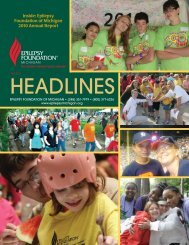Legal Rights of Children with Epilepsy in School & Child Care
Legal Rights of Children with Epilepsy in School & Child Care
Legal Rights of Children with Epilepsy in School & Child Care
Create successful ePaper yourself
Turn your PDF publications into a flip-book with our unique Google optimized e-Paper software.
<strong>Legal</strong> <strong>Rights</strong> <strong>of</strong> <strong><strong>Child</strong>ren</strong> <strong>with</strong> <strong>Epilepsy</strong> <strong>in</strong> <strong>School</strong> and <strong>Child</strong> <strong>Care</strong><br />
or a due process hear<strong>in</strong>g, or by fil<strong>in</strong>g a compla<strong>in</strong>t <strong>with</strong> the state department <strong>of</strong><br />
education. See Chapter 8 for more <strong>in</strong>formation about dispute resolution.<br />
4.9Q: What k<strong>in</strong>ds <strong>of</strong> assessments might be warranted to determ<strong>in</strong>e special<br />
education eligibility for a student <strong>with</strong> epilepsy?<br />
A: The school district is responsible for us<strong>in</strong>g a variety <strong>of</strong> assessment tools to<br />
determ<strong>in</strong>e the functional, developmental, and academic needs <strong>of</strong> the student. 34<br />
C.F.R. 300.304. See Question 4.10. For a student <strong>with</strong> epilepsy, it will be<br />
important to first establish that the student has epilepsy. Often, parents provide<br />
medical <strong>in</strong>formation to an IEP team regard<strong>in</strong>g their child. Parents may wish to<br />
provide current medical reports from the student’s neurologist and pediatrician,<br />
<strong>in</strong>clud<strong>in</strong>g a diagnosis, a list <strong>of</strong> current medications, and any <strong>in</strong>formation or<br />
recommendations that relate to the student’s performance or needs <strong>in</strong> school. An<br />
IEP team must consider any private evaluations provided by parents, although<br />
the team is not obligated to adopt the f<strong>in</strong>d<strong>in</strong>gs or recommendations <strong>of</strong> the<br />
evaluation.<br />
If the IEP team chooses not to accept the reports provided by the student’s<br />
parents, the school district will be responsible for obta<strong>in</strong><strong>in</strong>g its own medical<br />
evaluation <strong>of</strong> the child. Medical services are <strong>in</strong>cluded as a related service <strong>in</strong> the<br />
IDEA for “diagnostic or evaluation purposes” and are def<strong>in</strong>ed as “services<br />
provided by a licensed physician to determ<strong>in</strong>e a child’s medically related<br />
disability that results <strong>in</strong> the child’s need for special education and related<br />
services.” 34 C.F.R. 300.34(a) and(c)(5).<br />
It is also necessary to assess the student’s educational performance. A complete<br />
educational assessment is important and perhaps a cognitive psychological<br />
assessment will be warranted as well. It is also important to have a nurs<strong>in</strong>g<br />
assessment done if the student’s seizures are not completely controlled and if the<br />
student will be tak<strong>in</strong>g medication dur<strong>in</strong>g the school day. Depend<strong>in</strong>g on other<br />
areas <strong>of</strong> need, assessments for psychosocial issues, speech and language,<br />
functional behavioral issues, occupational therapy, and/or physical therapy<br />
might also be warranted.<br />
4.10Q: What are the requirements for evaluation?<br />
A: The school district must use a variety <strong>of</strong> assessment tools and strategies to<br />
collect relevant functional, academic and developmental <strong>in</strong>formation about the<br />
child. Information provided by the child’s parents must be <strong>in</strong>cluded <strong>in</strong> the<br />
assessment. The district may not use a s<strong>in</strong>gle measure or assessment as the only<br />
criterion for determ<strong>in</strong><strong>in</strong>g whether a student has a disability or determ<strong>in</strong><strong>in</strong>g an<br />
appropriate educational program. The district must use technically sound<br />
assessment <strong>in</strong>struments that may assess the extent to which cognitive and<br />
behavioral factors, as well as physical and developmental factors, contribute to<br />
the student’s situation. 34 C.F.R. 300.304(b). Assessment tools cannot be<br />
40








